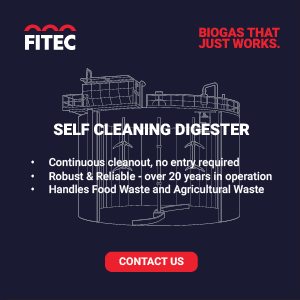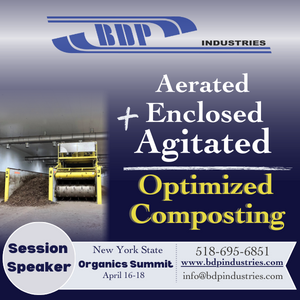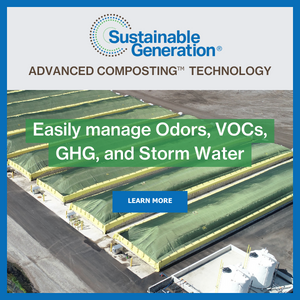BioCycle June 2008, Vol. 49, No. 6, p. 26
Rutgers University promotes development of local industry using organic residuals to make products that replace those made from oil.
Priscilla E. Hayes
EACH DAY, newspapers carry reports on the impact of the escalating cost of oil on our economy. Rising prices at fuel pumps and of petroleum-based products such as fertilizer and plastics has led to huge impacts on food supply and costs. Not only are the increased transportation costs making food more expensive, but increased corn grown for ethanol also reduces food supplies in a variety of ways.
In New Jersey, the Solid Waste Resource Renewal Group (SWRRG) at the Rutgers University Agricultural Experiment Station is leading an initiative that can serve as a model for other states or regions to follow. The Rutgers initiative seeks to promote development of a new local industry based on using food and other organic wastes to make products that replace some of those made from oil. These include fuel for vehicles and buildings, soil amendments and fertilizers. A recent Rutgers study, which SWRRG collaborated on, concluded that solid waste resources in New Jersey are our primary sources of biomass, and far exceed what could possibly be grown for fuel and other products.
Bringing food waste recycling to New Jersey continues to depend on getting generators of the materials engaged and committed to recycling, working with governments at all levels to create a welcoming regulatory climate, as well as active support mechanisms such as tax credits for recycled/ green purchasing. At the same time, it requires working with individual businesses seeking to grow or expand a food waste recycling business. One of the biggest challenges continues to be the lack of awareness of how crucial food waste recycling is, not only to enhance the state economy, but also to reduce greenhouse gas production and raise the state’s recycling rate. And, ultimately, the challenge is to raise awareness of how this can save resources for future generations.
Another critical factor to building an industry is identifying investors to support the new technologies and products that entrepreneurial food waste recycling companies are developing. A critical piece of SWRRG’s initiative is creating the awareness of the need for and value of this industry that will not only produce vital products, but will keep dollars working in New Jersey, rather than being sent out of state or out of country. It will also create local jobs.
COUNTY-BASED FOOD WASTE RECYCLING FORUMS
SWRRG has initiated a series of food waste recycling forums across New Jersey, going county-by-county to educate generators and governmental representatives, and at the same time working to create a greater understanding of the cooperative forces that need to be brought together. Already, with five forums completed, SWRRG is finding the level of awareness and interest rising across the state, creating a more favorable climate for the industry. Thus, while the forum series functions to educate stakeholders across the state, it is also meant to lead up to an investment forum, which will bring food waste recycling entrepreneurs together with potential investors. New food waste recycling companies – as well as those interested in relocating or expanding to New Jersey – and investors seeking exciting new opportunities for green investment are all welcome.
The basic agenda for the forums includes the following: Current and proposed food recycling facilities; Case studies of successful generator programs; Actions to take now, including contracting information, waste audits and selecting products for individualized food waste recycling programs; Relationship of food waste recycling and greenhouse gas reduction; Promotional benefits of recycling; and County and municipal strategies for promotion of food waste recycling.
The April 2008 forum, “Teach Today, Save Tomorrow,” hosted by Rowan University and Sodexo Campus Services, was particularly focused on schools and higher education institutions. It featured a presentation by the entire Seventh Grade of Lavallette Elementary School. These students were integral, along with their teachers, principal and head custodian, in creating one of the best school recycling systems in the country. The students described their current work to go beyond recycling of bottles, cans, paper and cardboard to institute an on-site food scraps composting program. SWRRG is collecting examples of successful school food waste recycling programs that, like Lavallette Elementary School, incorporate the recycling program into hands-on curriculum.
CREATING A STAKEHOLDER ORGANIZATION “FOR NJ”
Another exciting development has been the formation of a new professional and stakeholder organization called Food and Organics Recycling for New Jersey (FOR NJ). This organization is complementary to SWRRG and provides stakeholders new opportunities for participation and recognition. FOR NJ was cofounded by Jennifer McDonnell of Whole Foods Market and Priscilla Hayes of SWRRG. The working description of the organization is: “Food and Organics Recycling for New Jersey (FOR NJ) is a trade, professional and stakeholder organization that promotes the expansion of markets for recycled organic products, connects interested parties and enlists public support for food and organics composting and recycling as appropriate responses to various environmental and sustainability issues. FOR NJ is also involved in research and public education, as well as the development and promotion of recycling technologies, facilities and industry standards.”
FOR NJ and its members are working to promote an understanding of the importance of using food residuals (also known as “food waste”) and other organic wastes, including biosolids, by promoting resource management for a cleaner and more productive economy, environment and culture for all. More specifically, the goal of the organization is to promote a more sustainable use of food residuals and other organics such as paper and yard trimmings, manures, biosolids and incidental organics. FOR NJ supports the composting or recycling of these materials through various methods that generate bioproducts, including energy, fuel, soil amendments and fertilizers. FOR NJ also provides a forum for the emerging industries that are beginning to manufacture these valuable products, produce jobs and capital, and reduce greenhouse gases locally.
Ongoing FOR NJ projects include the creation of certification programs for generators, governments, recycling facilities and others. Entities certified under the FOR NJ program would then be able use the FOR NJ logo for promotion. The Lawrenceville School, a private secondary school in Lawrence-ville, New Jersey, has stepped up to be the first entity certified, working with SWRRG through the details of the certification process.
EXISTING COMPANIES
The following entrepreneurs, assisted by SWRRG, are currently operating in New Jersey.
Premier Management is a hauling company that currently transports food waste from over 75 New Jersey supermarkets to composting facilities or pig farms in Pennsylvania. Premier worked with Michael Manna, a food waste recycling expert, to develop a collection container system, with either a compactor or wheeled carts left at the generator, depending on their needs. For those using the cart system, Premier invested in trucks that allow the carts to be tipped by a mechanical arm, which reduces labor costs and possible risk of employee injury.
Premier continues to develop the most efficient hauling systems possible. Currently, it seeks to build a food waste transfer station that would allow food waste to be transferred from smaller containers to those known as “walking floors,” for transport to current destinations, all in Pennsylvania. The transfer station would also allow for the removal of any contaminants, as well as the mixing of food waste with carbon sources such as cardboard, to assure the food waste is accepted at its final Pennsylvania destinations.
Terracycle is committed to recycling wherever possible, packaging vermicompost products (liquids) in reused plastic soda bottles, collected through school recycling drives. Tom Szaky and Jon Beyer developed their system for worm composting of food waste while in college, and began using the resulting vermicompost to make a liquid plant fertilizer, which is now sold at Home Depot and other stores across North America. The product is meant to show “the power of worm poop.”
Ag Choice is a small composting facility in Andover, which composts food waste from area supermarkets and horse manure. The facility was developed to help horse farmers with their growing problem of preventing pollution from horse manure. Ag Choice uses techniques and materials developed by Midwest Bio-Systems and Advanced Composting Systems to produce a “humified compost” containing humus and humic acids. Using the compost promotes plant root development, and eventually healthier plants.
Windrows are constructed out of food waste, woodchips, water soaked round bales and manures, among other feedstocks. Clay is layered upon the mixture to reduce odors, capture additional microbes and promote formation of humus. The windrows are then covered with specially designed material that repels water and UV rays, and keeps existing moisture in. (For more on Ag Choice, see “Pragmatic Farm Composters Forge New Path To Resource Recovery,” BioCycle November 2007.)
COMPANIES COMING SOON TO NEW JERSEY
Converted Organics built a facility that will soon receive source separated organic food waste to be processed into high-quality organic biostimulants (natural soil amendments or fertilizer products). The process uses microbes, oxygen and heat, in stainless steel digesters, to convert food wastes to a marketable product in 72 hours. The facility is expected to process between 80,000 and 100,000 tons/year of food waste. Food waste will be accepted in both solid and liquid forms, from a variety of sources including produce handlers, food processors, supermarkets, farmers’ markets, restaurants, hospitals and airlines. Operations are expected to start this summer (see sidebar).
Trenton Fuel Works is planning to convert a never-used sewer plant in Trenton for production of either a patented fuel blend for flexible fuel vehicles or a cellulosic biodiesel for use in trucks, buses and farm equipment. The plant will make its products from a range of feedstocks, such as food waste, manures, grass clippings, leaves and nonrecyclable paper. Trenton Fuel Works is the first commercialization of a patented, EPA award winning, biofuels technology in the United States that thermochemically converts organic waste into renewable products. If this facility is successful, there are plans to develop other plants using the technology.
Peninsula Compost is planning to build a facility in Burlington Township, New Jersey. Peninsula Compost is a Delaware-based company that processes food and yard waste into compost. Peninsula Compost is expecting to accept about 100,000 tons/year of food waste and 60,000 tons of carbon material. The company is building a similar facility in Wilmington, Delaware that is utilizing the GORE Cover system designed to prevent water from seeping in and odor from escaping.
Priscilla E. Hayes, Esquire, is Executive Director of Solid Waste Resource Renewal Group (SWRRG), part of the School of Environmental and Biological Sciences at Rutgers, the State University of New Jersey. She can be reached at hayes@aesop.rutgers.edu, or for more on SWRRG, visit www.swpg.rutgers.edu.
FROM MACERATION TO DIGESTION
IN THE summer of 2008, New Jersey is expecting the first of a new crop of large-scale food waste recycling facilities that will utilize some of the plentiful food waste from the nation’s most densely populated state. Converted Organics, Inc. will be colocated on the waterfront in Keasbey, New Jersey with Bayshore Recycling, which is already involved in innovative recycling of other less traditional recyclables, such as construction and demolition debris, and contaminated soil.
Converted Organics will use Enhanced Autogenous Thermophilic Aerobic Digestion (EATAD), an in-vessel technology that transforms high quality source separated food waste into an all natural soil amendment. This technology has been operating in Vancouver, British Columbia, Canada for more than seven years.
The process begins with organic materials separated and sent to a macerator. Next, the pulp is placed into digesters where bacteria are added, which require oxygen to convert the food waste into single cell proteins. A patented aeration device promotes the growth of beneficial bacteria, which in turn generate enough heat to sustain the temperature of the digester. After 14 to 20 hours, complete pasteurization is achieved and all pathogens destroyed. Digestion then continues, with the temperature peaking at approximately 80°C. After 72 hours, the food waste is 100 percent converted, notes Jack Walsdorf of Converted Organics, and the temperature no longer increases. At that point, the material is ready to be marketed.
Initially, the Converted Organics recycling facility will accept an estimated 78,000 tons of food waste annually for processing. Capacity will double after initial operations reach maturity. It is estimated that this facility will produce approximately 25 tons of fertilizer pellets and 23 tons/day of liquid fertilizer. The fertilizer can be used in the agribusiness, turf management and retail markets. Recent studies conducted on the soil amendment at Cornell University have suggested it reduces the need for chemical pesticides and chemical based fertilizers. Thus the product will provide an alternative to traditional fertilizers, and limit potentially harmful effects, such as nutrient runoff.
June 18, 2008 | General










